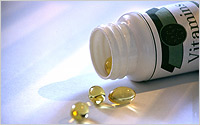
Nutritional supplements have thrived throughout the recession and its lingering aftermath, and 2012 is no exception, according to a new report from Packaged
Facts.
The researcher estimates that the supplement category’s dollar sales grew by 31.7% and realized a compound annual growth rate/CAGR of 7.1% between 2008 and 2012 -- including
projected 6.5% growth, to $1.5 billion, in 2012.
General supplements -- which include mineral, herbal and other non-vitamin supplements and combination supplements -- led the category, showing
51% growth between 2008 and 2012. They were followed by multivitamins (25.8%), “1- and 2-letter” vitamins (16.8%) and liquid supplements (6.4%).
Factors contributing to the growth
include the swell of aging Baby Boomers; expanded products addressing condition-specific health issues (many of which are age-related); rising health care costs that have motivated consumers to use
supplements to try to ward off health issues; and parents’ increasing propensity to buy supplements for their children, according to the report.
advertisement
advertisement
These factors also feed into Packaged
Facts’ projection that sales of nutritional supplements will reach $15.5 billion by 2017, reflecting a CAGR of approximately 6%.
Sales through mass-market retail channels
(supermarkets, drug stores and mass merchandisers other than Wal-Mart) were up 5.4% for the 52 weeks ending June 10, 2012, according to SymphonyIRI. Supercenters and mass merchandisers account for
just under a third of market sales, followed by 26% for natural/specialty stores, 21% for drug stores, 12% for traditional supermarkets, and 10% for the rest (including warehouse club stores and the
Internet).
And for national brands, the good news is that private-label share of SymphonyIRI-tracked mass-market supplement sales declined by two points for the 52 weeks ending June 10, from
26.2% to 23.7%. (PL products in all four supplement categories saw a drop in both sales and market share.)
However, the researcher points out that marketers need to address the 18-29 age
demographic (whose supplement usage has been declining), as well as the key-to-growth Hispanic population (whose supplement usage is below average, although gradually rising).
The report also
stresses the need to be adroit in target marketing to the prime target demographics of consumers 65 and older, and the aging Boomers following them.
It also emphasizes that product efficacy
and credibility -- producing and marketing supplements with scientifically substantiated health claims -- is becoming even more crucial as scrutiny and regulation of this market reaches an all-time
high.